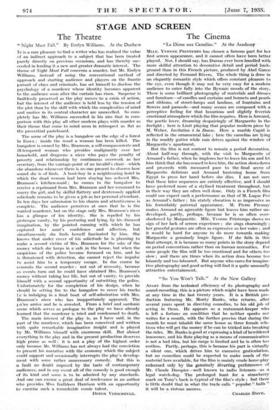STAGE AND SCREEN The Theatre
"Night Must Fall." By Emlyn Williams. At the Duchess
IT is a rare pleasure to find a writer who has realized the value of an indirect apnroach to a subject that has been treated purely directly on previous occasions, and has thereby suc- ceeded in lending it a new and greater dramatic interest. The theme of Night Must Fall concerns a murder, but Mr. Emlyn Williams, instead of using the conventional method of approach and starting audience and players on the frantic pursuit of clues and criminals, has set himself to disclose the psychology of a murderer whose identity becomes apparent to the audience soon after the curtain has risen. Suspense is faultlessly preserved as the play moves-to a crisis of action, but the interest of the audience is held less by the tension of the plot than by the skill with which the complexities of mind and motive in its central character are unravelled. So com- pletely has Mr. Williams succeeded in his aim that in com- parison with this play all other modern plays with murder as their theme that come to mind seem in retrospect as flat as the proverbial pasteboard.
The scene of the play is a bungalow on the edge of a forest in Essex ; inside the wood a woman has been killed. The bungalow is owned by Mrs. Bramson, a self-compassionate and ill-tempered woman who presides malignantly over her household, and dragoons a niece who pays the penalty of poverty and relationship by continuous overwork as her secretary, from the vantage-point of an invalid's chair—which she abandons whenever there is no one present to observe how sound she is of limb. A boot-boy in a neighbouring hotel in which the dead woman had been staying has seduced Mrs. Bramson's kitchen-maid ; he comes to the bungalow to receive a reprimand from Mrs. Bramson and her command to marry the girl, and by skilful flattery and dexterously applied solicitude remains to be given a job as her personal attendant. In ten days her submission to his charm and attentiveness is complete. The audience perceives at once that he is the wanted murderer, but on the stage only Mrs. Bramson's niece has a glimpse of his identity. She is repelled by his grotesque vanity, by his posturing and lying, by his diseased imagination, by the pointed cunning with which he has captured her aunt's confidence and affection, but simultaneously she finds herself fascinated by him. She knows that under cover of his solicitude he is planning to make a second victim of Mrs. Bramson for the sake of the money which she keeps in a 'safe in the house, but when the suspicions of the police become focussed on him, and he is threatened with detection, she cannot reject the impulse to assist him to a temporary escape. In due course he commits the second murder : not out of necessity, because as events turn out he could have obtained Mrs. Bramson's money without taking her life, but out of vanity, to provide himself with a second opportunity of outwitting the police. Unfortunately for the completion of his design, when he should be setting fire to the bungalow to cover his tracks he is indulging in a final bout of self-admiration with Mrs. Bramson's niece who has inopportunely appeared. The I dace arrive and he is arrested. From a brief and sardonic scene which serves as prologue to the play we have already learned that the murderer is tried and condemned to death.
The main interest of the play is, as I have said, in the part of the murderer, which has been conceived and written with quite remarkable imaginative insight and, is played by Mr. Williams himself with enormous skill. But almost everything in the play and in the present production deserves high praise as well : it is not a play of the highest order only because Mr. Williams has not always had the conviction to present his narrative with the economy which the subject could support and occasionally interrupts the play's develop- ment with some rather unnecessary comedy. But this is a fault no doubt imposed by the taste of contemporary audiences, and in any event all of the comedy is good enough of its kind and some is to be admired by any standards. And one can excuse a great deal of irrelevance in an author who provides Miss Kathleen Harrison with an opportunity to exercise such a remarkable comic talent.
- DEREK VERSCHOYI.E.










































 Previous page
Previous page